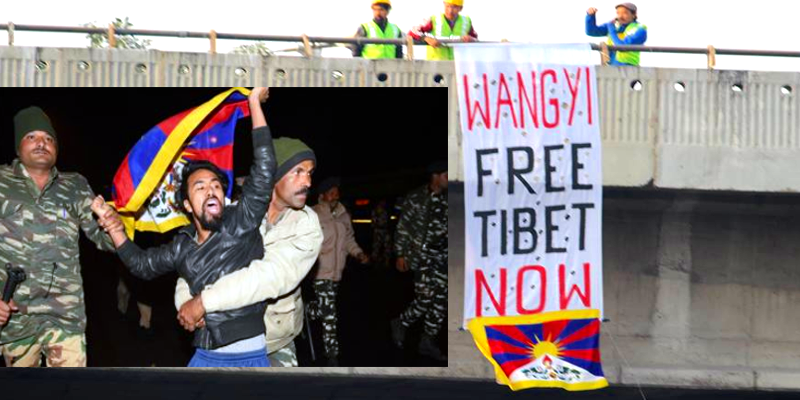9 Tibetans detained after staging protests against the Chinese delegation to India for the trilateral meeting being held in New Delhi. The Students For Free Tibet, India carried out the series of protests against the Chinese delegation led by their foreign minister Wang Yi and nine Tibetans were detained for while protesting outside the Imperial Hotel where the Chinese are staying.
“The police, on Monday, detained nine Tibetans for allegedly protesting outside Imperial Hotel where the Chinese delegation is staying. The delegation includes China’s Foreign Minister Wang Yi.” said the report in The Hindu.
“Nine protestors have been detained at Connaught Place police station. They were protesting 200 metres away from the hotel near the police barricades” Deputy Commissioner of Police (New Delhi) B.K. Singh said according to the report.
The authorities have also shut down the Janpath Metro station and the Janpath road for public access in order to prevent suspected protests against the Chinese delegation. Wang Yi comes to attend the Russia-India-China (RIC) Foreign Ministers’ meeting held on Monday with his Indian and Russian counterparts Sushma Swaraj and Sergey Lavrov.
On December 10 during Chinese Foreign Minister Wang Yi’s arrival in India for the Russia-India-China Foreign Ministers’ trilateral meeting, Tibet activists kicked off their protest by unveiling(1) a 10ft by 4ft banner near Indira Gandhi International Airport, two hours before the Chinese foreign minister landed. The banner read “Wang Yi, Free Tibet Now.”
“The Russia, India and China meeting comes on the heels of an unprecedented environmental crisis in Tibet due to China’s creation of a 1,000-km long tunnel, which, if completed, would be the world’s longest by a huge margin, to divert the waters of the Brahmaputra from Tibet to the dry Xinjiang region. These activities are a major threat to India and other downstream countries whose survival depends on Tibet’s rivers.(2) Moreover, the human rights situation in Tibet has worsened dramatically in recent years as fundamental rights to freedom of expression, peaceful assembly, religion and privacy have been severely restricted.” said the press release of SFT India.

